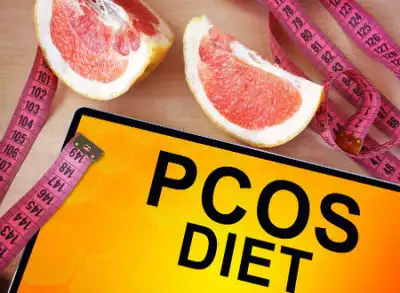Experts from Diet4u Wellness on PCOD & PCOS
During the holidays, perhaps 2 years ago, my friend received a PCOD diagnosis. The majority of our responses when she informed us about it upon her return to school were along these lines: "PCOD? Is this not known as PCOS? Conversely: "Wait, what precisely occurs in that? Simply erratic intervals, correct? Alternatively, and this is worse: "Oh, you just need to go onto a diet and lose weight, and everything will be okay."
Whether intentional or not, the ignorance was evident, but there aren't many easily understood resources on this topic, at least not in schools, and those that are aren't readily available. Since I'm not a licenced medical practitioner, I decided that the least that I could do was compile reliable data from a few reliable sources into a very basic and concise guide.
It's likely that you have heard of PCOD or PCOS at some time in your life if you are a menstruator or if you have spoken to enough others who are. Your prior knowledge of the two may differ depending on the context; misconceptions and false information on these unexpectedly prevalent health conditions are widespread, and the 2 abbreviations are frequently used interchangeably despite their differences. Let's first discuss what the two are in general—their causes, their therapies, etc.—before delving into the specific differences between them.
PCOD
The main causes of PCOD (polycystic ovarian disease) are a mix of genetic predispositions and hormone imbalance. Every month, the two ovaries in a typical menstrual cycle will release mature, fertilised eggs in turn. However, the ovaries of a person with PCOD frequently release premature or only partially complete eggs, which can later grow into cysts, which are tiny sacs filled with liquid.
Additionally, this causes the ovaries to expand and bulge. In this situation, your ovaries will start generating androgens in excessive amounts, which causes symptoms like a pattern of male hair loss, abdominal gain in weight, periods that are not regular, and in certain instances, even infertility. Normally, the ovaries discharge only a small quantity of androgenic hormones (male hormones) throughout the cycle.
Although there isn't a specific "cure" for PCOD, one of the most effective methods to manage it is to make lifestyle adjustments (of course, after consulting with experts: ideally, your gynaecologist, an endocrinologist, and a dietician). The best ways to manage your PCOD are to exercise and eat a balanced diet that is high in protein and fibre and low in sugar and carbs. This also stops some of the gain in weight, which is highly beneficial because therapy is made much easier even with a 5% weight loss.
A person may receive medicine to assist balance their hormones, depending on the circumstances. In certain instances, second-line treatments such as aromatase inhibitors, laparoscopic surgery, and ovarian drilling may even be necessary. It is not very frequent, though. Individuals may also see other doctors for the specific treatment of some symptoms. For example, acne and loss of hair caused by PCOD can typically be resolved with skin treatments. While most cases require minimal assistance with conception and lead to a smooth pregnancy, twenty percent of cases (based on information gathered on Indian women) might need fertility medications or other treatments to enhance fertility should the patient wish to become pregnant.
Signs of PCOD!
Being aware of PCOD's early warning signs and symptoms will help you manage the condition. You have to realise that not every woman with PCOD experiences the same symptoms and indicators. Even though they differ from person to person, PCOD can be treated with exercise and the diet plan for PCOD & PCOS in Gurugram.
PCOD often begins in puberty, around the time of the first menstrual period. Like with many other conditions, PCOD can arise from an unhealthy lifestyle that leads to weight gain.
Let's examine the symptoms to gain a better grasp of this prevalent lifestyle illness. Seek medical advice if you suffer from more than one of these symptoms:
Non-Regular Times
One of PCOD's most prevalent symptoms is this one. Menstrual cycle irregularities can last anywhere from two to seven months, and in certain situations, longer. Aside from irregular menstruation, PCOD can also cause excessively heavy periods that can linger for several days.
Overabundance of Androgen
Another component that contributes to PCOD is an increase in androgen levels, which are found in males. Abrupt growth of face and body hair represents one of the first signs of PCOS and PCOD caused by androgen. This disorder, commonly referred to as hirsutism, results in undesired hair growth around the breast area, in the back, upper arms, and legs, as well as the chin. Male pattern baldness and severe acne are other indications of hirsutism.
Ovary Polycystic
The ovaries often swell in PCOD because several little fluid-filled sacs begin to form inside of them. These sacs, often referred to as follicles, hold immature eggs that are incapable of ovulation. Androgen is elevated as a result of these cysts' further manipulation of progesterone, oestrogen, FSH, and LH levels.
What is the use of PCOD & PCOS diet plan in Gurugram?
Through adherence to a PCOD Meal Chart, one can begin managing PCOD symptoms and preserve your health. Dietary charts typically advise consuming meals that assist the body in receiving enough nutrients, such as green and leafy vegetables.
Make careful to include foods high in calcium, protein, iron, potassium, magnesium, and several vitamins, including vitamin B, when creating a PCOD diet chart.
Dietary factors primarily affect insulin production and tolerance as well as weight management in PCOD patients. It is significant to remember that insulin is essential for PCOD. Thus, one of the most effective ways to manage the illness is to adopt a diet that controls insulin levels.
Adopt a diet that satisfies your nutritional needs, controls extra weight, and encourages normal insulin levels for the greatest outcomes.
Diet Chart based on PCOD & PCOS diet consultation in Gurugram
Let's examine some meals that are guaranteed to help manage PCOD symptoms:
Berries
Fruits are an absolute must in your diet plan. You can include fruits in your diet such as apples, strawberries, blueberries, blackberries, cherries, and red grapes. Because of their low glycaemic index (GI), these fruits can improve insulin sensitivity.
Green Vegetables
Broccoli, spinach, and other green leafy vegetables are great complements to a PCOD diet chart. They may also help to enhance skin health and blood circulation.
Opulent fibre
Foods high in fibre, like oranges, beans, avocados, almonds, peas, and avocados, assist manage PCOS symptoms and have to be included in the PCOD Diet Chart.
Nuts
Rich in heart-healthy fats, walnuts, almonds, pistachios, and pine nuts are among the many types of nuts that can aid with PCOD.
Sea Foods
Lean meats are fine to include in your diet, but a PCOD & PCOS dietician in Gurugram asks for Weight Loss needs to include fatty, omega-rich fish like salmon, sardines, mackerel, and tuna.
Summary
With careful attention to nutrition and exercise, PCOD, like all lifestyle diseases, can be managed and healed. For effective therapy, you can speak with a physician who can advise you on the PCOD diet that will work best for you. The doctor can offer behavioral tactics, such as goal-setting and self-monitoring techniques, in addition to dietary advice, to help you reach your objectives more quickly and effectively.






